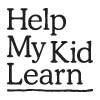Ages and stages
At this age children use language in many different ways - to explain, describe, question and share. They ask questions and discuss ideas and information to communicate and develop their thinking and learning.
Ages 10 to 12
At this age children use language in many different ways - to explain, describe, question and share. They ask questions and discuss ideas and information to communicate and develop their thinking and learning.
By the ages of 10 or 12 children are able to listen for longer and they notice the way people say things. They discover deeper meanings from this both in conversation and in reading. They know that meaning includes information and feelings. They can talk in detail about things that happened in the past or are planned for the future.
They know that some words have two meanings and use them correctly. They know basic grammar rules and can explain them to you or to younger brothers and sisters.
They are starting to think and make judgements about where information comes from. They can consider how writers put across their thoughts and ideas. They can start to see how the media works and how it communicates certain ideas through both words and pictures. At this age some children start to see how some kinds of reading and writing have more power in the world than others.
Children of 10 and 12 are beginning to understand and use large numbers. They can see the patterns and relationships between numbers. They are learning and using their times-tables. They are learning to multiply and divide whole numbers, fractions and decimals.
Most children now understand when it is suitable to estimate and when it is important to calculate an exact answer. They are often good at estimating. They are familiar with notes and coins and can use both to give change.
At this age many children have good IT skills and use computers for both leisure and learning. They are developing a clearer understanding of the strengths, limitations and risks of the internet. They know that the information they find on the internet may, or may not, be reliable.
Your child might enjoy discussing books, newspapers, magazines or TV programmes. They might like to tell you why they like certain books or programmes. They can explain what they think will happen next and what makes them think this. They can discuss different characters and relationships. Some children now read a lot, others may still find it a bit of a struggle. Your support and encouragement help, whatever stage they are at. You might want to ask your child’s school to give extra help with their reading if they are finding it hard.
Creativity is still important but varies a lot by this age. Some children start to do their own plays or concerts. Many like to draw and paint. Some make complicated structures with lego or create items with wood. Others are creative in their cooking or gardening. These activities are important for learning and should be encouraged.
